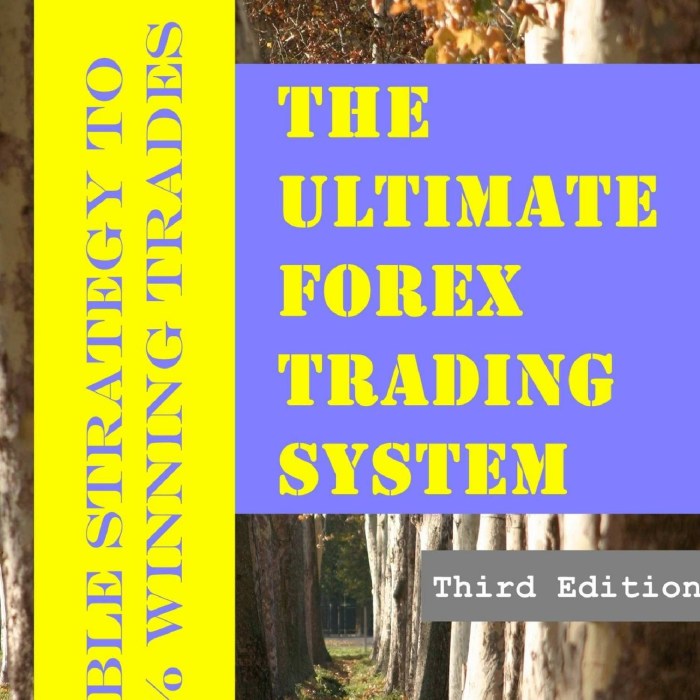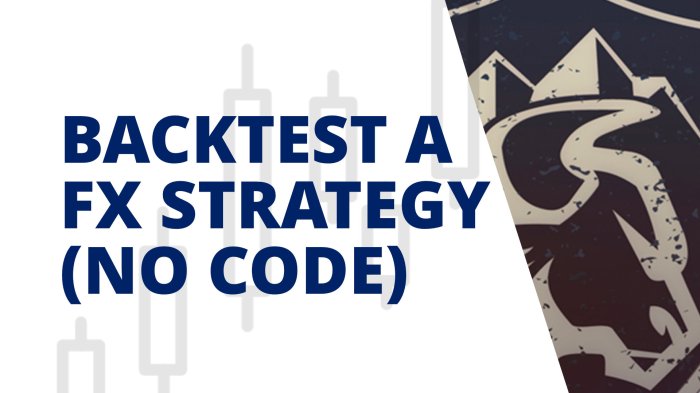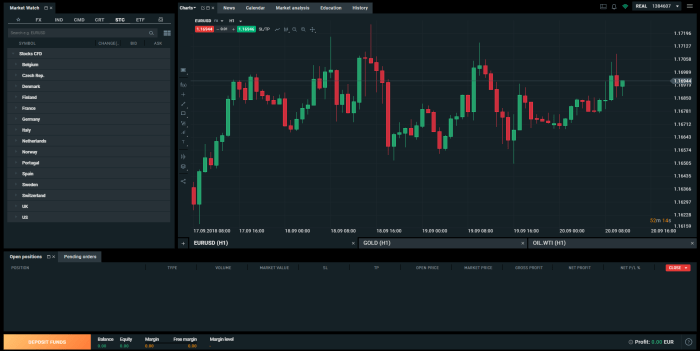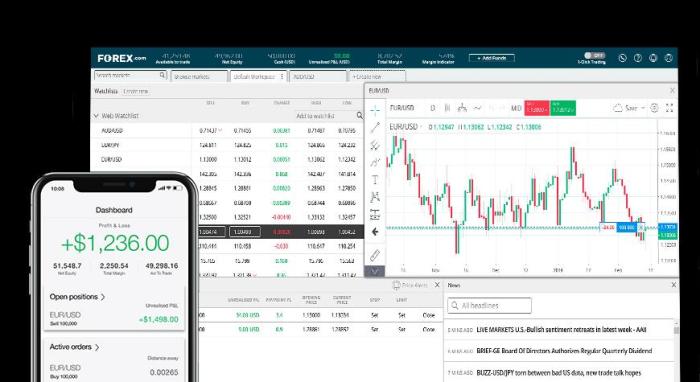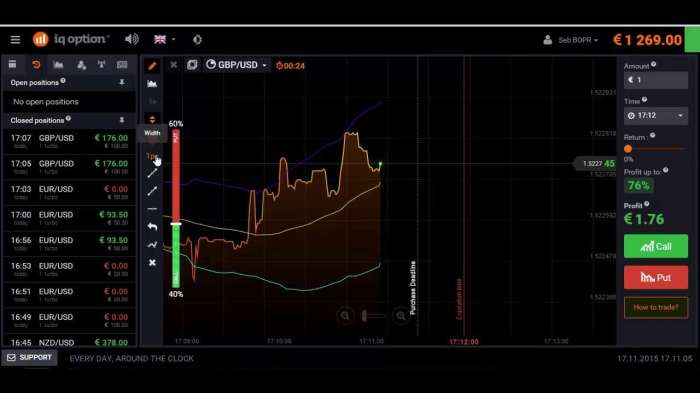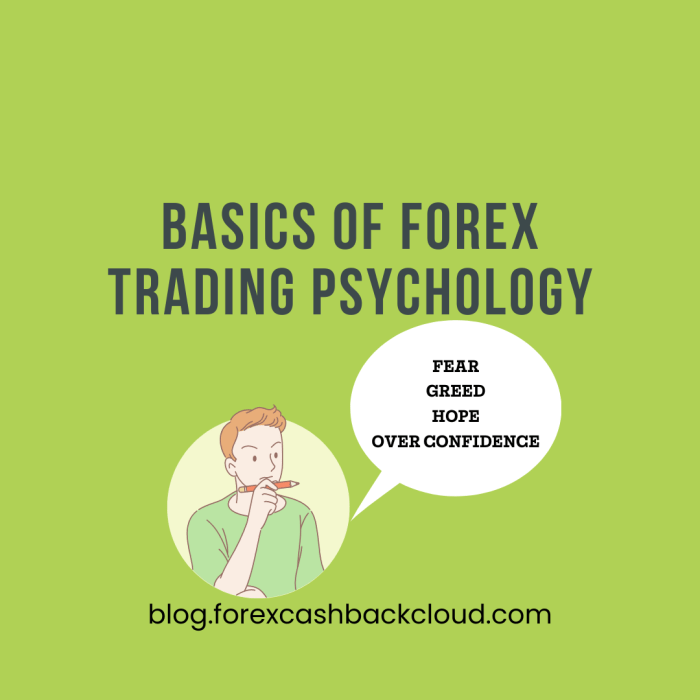
The Role of Forex Trading Psychology in Success: Think you can just throw money at the forex market and become a millionaire overnight? Think again. This isn’t some get-rich-quick scheme; it’s a high-stakes game where your emotional intelligence might be your biggest asset. We’re diving deep into the psychological rollercoaster that is forex trading, exploring how fear, greed, and cognitive biases can either make or break your trading journey. Get ready to unlock the secrets to mastering your mind and conquering the market.
From understanding the emotional landscape of the forex market – those sneaky biases that trip up even the most seasoned traders – to developing a rock-solid trading psychology, we’ll cover it all. We’ll equip you with practical strategies to manage stress, build resilience, and cultivate a winning mindset. Because let’s be real, trading is as much a mental game as it is a financial one.
Understanding the Forex Market’s Emotional Landscape: The Role Of Forex Trading Psychology In Success
The forex market, with its constant fluctuations and high-stakes potential, is a breeding ground for intense emotions. Understanding how these emotions impact your trading decisions is crucial for long-term success. Ignoring the psychological aspect can lead to devastating losses, even with the best technical analysis. This section delves into the emotional rollercoaster of forex trading, highlighting common pitfalls and strategies for maintaining emotional control.
Common Psychological Biases in Forex Trading
Several cognitive biases significantly influence forex traders’ judgment. Confirmation bias, for example, leads traders to seek out information that confirms their existing beliefs, ignoring contradictory evidence. This can result in holding onto losing trades for too long or entering trades based on incomplete or biased information. Overconfidence bias, often fueled by early successes, causes traders to underestimate risk and overestimate their abilities, leading to reckless trading. Availability bias makes traders overemphasize recent events, potentially causing them to overreact to short-term market movements. For instance, after experiencing a string of losses, a trader might become overly cautious, missing out on profitable opportunities.
The Impact of Fear and Greed on Trading Decisions
Fear and greed are two powerful emotions that drive many forex trading decisions, often leading to poor outcomes. Fear of loss can cause traders to exit trades prematurely, locking in small losses instead of waiting for a potential recovery. Conversely, greed can lead traders to hold onto winning trades for too long, hoping for even greater profits, only to see those profits evaporate as the market reverses. The fear of missing out (FOMO) is another significant factor, pushing traders into impulsive decisions without proper analysis, leading to unnecessary risk-taking.
Psychological Effects of Winning and Losing Streaks
Winning streaks can inflate a trader’s ego, fostering overconfidence and reckless risk-taking. This can lead to larger position sizes and ignoring risk management rules, ultimately jeopardizing profits. Conversely, losing streaks can trigger feelings of frustration, despair, and self-doubt, leading to impulsive decisions driven by the desire to recoup losses quickly. This often results in further losses and a vicious cycle of emotional trading. For example, a trader experiencing a losing streak might increase their leverage in an attempt to quickly recover, significantly increasing their risk exposure.
Cognitive Distortions in Forex Trading
Cognitive distortions are systematic errors in thinking that affect our perception of reality. In forex trading, these distortions can lead to flawed judgments and poor decision-making. For example, the illusion of control, a common cognitive distortion, leads traders to believe they have more influence over market outcomes than they actually do. This can lead to overtrading and a disregard for risk management. Hindsight bias, the tendency to believe that past events were predictable, can lead traders to overestimate their ability to predict future market movements. This can lead to overconfidence and increased risk-taking.
Rational vs. Emotional Trading Approaches
| Aspect | Rational Trading | Emotional Trading |
|---|---|---|
| Decision-Making | Based on objective analysis, risk management, and a well-defined trading plan. | Driven by fear, greed, hope, and other emotions, often ignoring analysis and risk management. |
| Risk Management | Strict adherence to stop-loss orders, position sizing, and diversification strategies. | Often neglects risk management, leading to excessive risk-taking and potential large losses. |
| Discipline | Consistent adherence to the trading plan, regardless of market conditions or emotional state. | Impulsive actions driven by emotions, leading to deviations from the trading plan and inconsistent results. |
| Outcome | Generally leads to consistent profitability and long-term success. | Often results in inconsistent results, significant losses, and emotional distress. |
Developing a Robust Trading Psychology
Conquering the forex market isn’t just about charts and indicators; it’s a mental game. Your emotional resilience and psychological fortitude are as crucial as your trading strategy. Developing a robust trading psychology involves understanding your emotional responses, implementing effective risk management, and cultivating a mindset that thrives under pressure. This isn’t about becoming emotionless; it’s about harnessing your emotions to make smarter, more consistent trading decisions.
Risk Management’s Role in Emotional Control
Effective risk management is the cornerstone of emotional stability in forex trading. By pre-defining your risk tolerance – the maximum percentage of your capital you’re willing to lose on a single trade – you create a safety net that prevents emotional overreactions. For example, a 1% risk per trade means that if you have a $10,000 account, you’d only risk $100 on each trade. This limitation prevents catastrophic losses that could trigger panic selling or impulsive revenge trading. Sticking to your predetermined risk limits helps you detach from the emotional rollercoaster of individual trades, allowing you to focus on the long-term strategy. This approach transforms fear and greed into calculated risks, making losses less devastating and wins more sustainable.
Strategies for Maintaining Trading Discipline
Discipline is paramount in forex trading. Impulsive trades, driven by fear or greed, often lead to losses. To cultivate discipline, develop a detailed trading plan that Artikels your entry and exit strategies, risk management rules, and position sizing. This plan should be adhered to rigorously, regardless of market fluctuations. Consider using a trading journal to track your trades, analyzing both successes and failures to identify patterns in your decision-making. Regularly reviewing your journal can highlight emotional biases and impulsive tendencies, providing valuable insights for improvement. Furthermore, automating parts of your trading process, such as setting stop-loss and take-profit orders, can help eliminate emotional interference during crucial moments.
Managing Stress and Anxiety in Forex Trading
Forex trading can be inherently stressful. Market volatility, unexpected news events, and the constant pressure to profit can take a toll. Managing stress effectively requires a multifaceted approach. Prioritize sufficient sleep, regular exercise, and a healthy diet to maintain physical and mental well-being. Consider mindfulness techniques like meditation or deep breathing exercises to calm your nerves and improve focus. Setting realistic expectations and celebrating small wins can boost morale and prevent burnout. Remember that losses are a part of trading; accepting them as learning opportunities prevents them from spiraling into overwhelming anxiety.
Building Confidence and Resilience
Building confidence and resilience requires consistent effort and self-belief. Focus on continuous learning and improvement. Regularly review your trading strategy, adapt to market changes, and seek feedback from experienced traders. Celebrate your successes, but don’t let losses discourage you. Each trade, regardless of the outcome, provides valuable learning opportunities. Remember that successful forex trading is a marathon, not a sprint. Consistency and perseverance are key to long-term success. Embrace the learning process, and view setbacks as temporary obstacles rather than insurmountable challenges.
A Step-by-Step Plan for a Positive Trading Mindset
Cultivating a positive trading mindset is a journey, not a destination. Here’s a step-by-step plan:
1. Self-Assessment: Understand your emotional triggers and trading biases.
2. Risk Management Plan: Define your risk tolerance and stick to it.
3. Trading Plan Development: Create a detailed trading plan with clear entry and exit strategies.
4. Journaling: Track your trades and analyze your decision-making process.
5. Stress Management Techniques: Implement stress-reduction techniques like meditation or exercise.
6. Continuous Learning: Stay updated on market trends and refine your trading strategies.
7. Celebrate Successes: Acknowledge and reward your achievements.
8. Embrace Losses: View losses as learning opportunities and adjust your approach accordingly.
9. Seek Mentorship: Learn from experienced traders and seek guidance when needed.
10. Patience and Persistence: Remember that consistent effort leads to long-term success.
The Role of Self-Awareness in Forex Trading Success
Success in forex trading isn’t just about charts and indicators; it’s deeply intertwined with your understanding of yourself. Ignoring your emotional responses and ingrained biases can lead to costly mistakes. Developing a strong sense of self-awareness is crucial for navigating the volatile world of currency markets and consistently making sound trading decisions. This involves recognizing your strengths and weaknesses, understanding how your beliefs shape your actions, and using this knowledge to refine your trading strategy.
Identifying Personal Strengths and Weaknesses in Forex Trading
Understanding your personal strengths and weaknesses is the cornerstone of self-awareness in forex trading. Are you a patient, disciplined trader who excels at long-term strategies, or are you more impulsive, preferring short-term trades with potentially higher risk? Perhaps your strength lies in fundamental analysis, while technical analysis proves more challenging. Identifying these inherent traits allows you to tailor your trading style to your strengths and mitigate the risks associated with your weaknesses. For example, if you’re prone to impulsive decisions, you might benefit from implementing stricter risk management rules, like setting predetermined stop-loss orders, to prevent emotional trading from derailing your strategy. Conversely, if patience is a strength, you might excel at swing trading or long-term position holding.
Analyzing the Impact of Personal Beliefs and Assumptions on Trading Decisions
Our beliefs and assumptions, often formed unconsciously, significantly influence our trading decisions. A common example is confirmation bias, where traders selectively focus on information confirming their existing beliefs while ignoring contradictory evidence. This can lead to holding onto losing trades for too long or entering trades based on flawed assumptions. For instance, a trader who believes a particular currency pair is “due” for a rebound might ignore negative economic indicators, leading to further losses. Recognizing and challenging these deeply held beliefs is vital for objective decision-making. Consider regularly questioning your assumptions and actively seeking diverse perspectives to counteract bias.
Utilizing Self-Reflection to Improve Trading Outcomes
Self-reflection is a powerful tool for improving trading outcomes. By regularly reviewing your trading journal (more on this below), you can identify patterns in your behavior and pinpoint areas for improvement. Did you panic and sell too early during a market dip? Did you let a winning trade run too long, only to see profits evaporate? Analyzing these situations objectively, without self-criticism, allows you to learn from mistakes and refine your approach. This process fosters continuous learning and growth, ultimately leading to better trading decisions and improved performance.
Journaling Techniques for Tracking Emotions and Trading Performance
Maintaining a trading journal is an effective method for enhancing self-awareness. This isn’t just about recording trades; it’s about documenting your emotional state before, during, and after each trade. Include notes on your feelings (fear, greed, excitement, etc.), your thought process, and the rationale behind your decisions. For example, you might write: “Entered a long position on EUR/USD at 1.1050 based on positive economic news. Felt confident initially, but experienced anxiety as the price dipped slightly. Held the position, and it eventually rebounded, resulting in a 50-pip profit.” This detailed record allows you to identify triggers for emotional trading and develop strategies for managing those emotions.
Resources for Improving Self-Awareness in Trading
Numerous resources can assist in improving self-awareness in trading. These include books on behavioral finance and trading psychology, workshops and seminars focusing on emotional intelligence, and online courses dedicated to improving trading psychology. Consider exploring resources that emphasize mindfulness techniques, such as meditation or yoga, as these can help cultivate emotional regulation and improve focus, which are invaluable assets in the high-pressure environment of forex trading. Furthermore, seeking mentorship from experienced traders can provide valuable insights and guidance on managing emotions and developing a robust trading psychology.
Harnessing Emotional Intelligence for Profitable Trading

Emotional intelligence (EQ) isn’t just a buzzword; it’s a crucial skill for navigating the volatile world of forex trading. Unlike IQ, which focuses on cognitive abilities, EQ centers on understanding and managing your emotions and those of others. Mastering your emotional responses to market fluctuations is key to making rational, profitable decisions.
Emotional Intelligence Models and Their Relevance to Forex Trading
Several models of emotional intelligence exist, each offering a slightly different perspective. The Goleman model, for instance, emphasizes self-awareness, self-regulation, social awareness, and relationship management. These aspects directly translate to forex trading: self-awareness helps identify biases; self-regulation prevents impulsive trades; social awareness aids in understanding market sentiment; and relationship management fosters collaboration with mentors and other traders. The Bar-On model focuses on intrapersonal and interpersonal aspects, highlighting the importance of emotional self-regulation in handling stress and uncertainty inherent in the forex market. Both models highlight the crucial role of self-awareness in recognizing and managing emotional responses to market events, thereby improving decision-making.
Emotional Intelligence Enhances Communication and Collaboration
High EQ fosters effective communication and collaboration. Traders with strong emotional intelligence can articulate their trading strategies clearly, actively listen to others’ perspectives, and constructively handle disagreements. This is vital when collaborating with mentors, seeking advice, or participating in trading communities. For example, a trader with high EQ can effectively explain their trading rationale to a mentor, even when facing criticism, and use that feedback to refine their strategy. Conversely, a trader lacking EQ might become defensive or dismissive, hindering their learning and growth.
Self-Regulation in Navigating Market Uncertainty
The forex market is inherently unpredictable. Self-regulation, a cornerstone of emotional intelligence, is paramount in navigating this uncertainty. It involves controlling impulsive reactions to market swings, avoiding emotional decision-making, and maintaining a calm, rational approach. For instance, a trader experiencing a significant loss might be tempted to make reckless trades to recoup their losses quickly. However, a trader with high self-regulation will take a step back, analyze the situation objectively, and develop a revised strategy based on data and logic rather than panic.
Managing Emotional Reactions to Unexpected Market Events
Unexpected market events, such as news announcements or geopolitical shifts, can trigger strong emotional responses. Effective strategies for managing these reactions include mindfulness techniques, such as meditation or deep breathing exercises, to calm the mind and promote clear thinking. Journaling can help identify emotional triggers and patterns. Setting realistic profit targets and stop-loss orders reduces the emotional impact of losses. Furthermore, maintaining a diversified portfolio minimizes risk and prevents over-reliance on any single trade, thus reducing emotional volatility.
The Interplay Between Emotional Intelligence and Successful Forex Trading
Imagine a Venn diagram. One circle represents “Successful Forex Trading,” encompassing elements like consistent profitability, risk management, and strategic planning. The other circle represents “Emotional Intelligence,” including self-awareness, self-regulation, social awareness, and relationship management. The overlapping area, the largest portion of the diagram, symbolizes the synergistic relationship between the two. Successful forex trading isn’t solely about technical analysis and market knowledge; it heavily relies on the ability to manage emotions effectively, make rational decisions under pressure, and collaborate constructively with others. The larger the overlap, the greater the likelihood of consistent trading success. The smaller the overlap, the more susceptible a trader is to emotional biases and impulsive decision-making, leading to inconsistent results.
Building a Sustainable Trading Plan
Your trading psychology is only as good as the plan supporting it. A solid trading plan isn’t just about technical analysis; it’s about building a framework that accounts for your emotional responses to market fluctuations. It’s the psychological safety net you need to navigate the unpredictable world of forex.
A comprehensive trading plan acts as your emotional compass, guiding you through moments of doubt and fear. It’s a detailed roadmap that Artikels your trading strategy, risk management techniques, and crucially, your approach to managing emotional stress. Without this plan, even the most skilled trader can easily fall victim to impulsive decisions driven by fear or greed.
Stress Management Integration, The Role of Forex Trading Psychology in Success
Integrating stress management techniques is vital. Forex trading can be incredibly stressful; unexpected market swings and potential financial losses can take a toll. Your plan should incorporate practical strategies to help you stay calm under pressure. This might include regular exercise, mindfulness practices like meditation, or even simply taking scheduled breaks away from the charts. It’s about building resilience to withstand the inevitable emotional roller coaster of trading. For instance, a trader might schedule a 30-minute yoga session after a particularly volatile trading day to de-stress and reset their mental state before the next trading session.
Progress Tracking and Plan Adjustment
Regularly tracking your trading performance is not just about profits and losses. It’s about observing your emotional responses to different market situations. A trading journal, for example, can be invaluable. Document your trades, including not only the financial outcome but also your emotional state before, during, and after each trade. This allows you to identify patterns in your behavior—when you’re most likely to make impulsive decisions, or when you tend to over-trade. This data provides crucial insights for adjusting your plan to better suit your psychological tendencies. If you notice a correlation between stress levels and poor trading decisions, you can then refine your stress management techniques or adjust your trading frequency accordingly.
Contingency Plans for Emotional Setbacks
Even the best-laid plans encounter unexpected challenges. Emotional setbacks are inevitable. Therefore, a robust trading plan incorporates contingency plans to navigate these difficult times. This could involve defining specific loss limits to prevent catastrophic financial losses triggered by emotional reactions. It could also involve pre-determined break periods to avoid burnout and allow for emotional recovery. For instance, a trader might decide to take a week off from trading if they experience three consecutive losing trades, acknowledging the potential impact of emotional fatigue on their decision-making.
Key Elements of a Psychologically Sound Trading Plan
A psychologically sound trading plan requires careful consideration of several key elements:
- Clearly Defined Trading Strategy: This includes your market analysis approach, entry and exit rules, and risk management protocols.
- Risk Management Protocol: Set stop-loss orders and position sizing strategies to limit potential losses and protect your capital.
- Stress Management Techniques: Identify and incorporate methods for managing stress and maintaining emotional balance. Examples include meditation, exercise, and scheduled breaks.
- Emotional Self-Awareness: Regularly monitor your emotional state during trading and identify triggers for impulsive decisions.
- Performance Tracking and Journaling: Maintain a detailed record of trades, including emotional responses, to identify patterns and adjust the plan accordingly.
- Contingency Plans: Develop strategies for dealing with emotional setbacks and periods of underperformance, such as predefined break periods or loss limits.
- Continuous Learning and Adaptation: Regularly review and refine the plan based on performance and psychological insights.
Epilogue
So, there you have it – the key to forex trading success isn’t just about charts and indicators; it’s about mastering your own mind. By understanding the psychology behind trading, developing a robust trading plan, and honing your emotional intelligence, you can navigate the volatile world of forex with confidence and increase your chances of long-term success. Remember, it’s a marathon, not a sprint. Embrace the journey, learn from your mistakes, and watch your trading prowess soar.
Top FAQs
How can I identify my personal biases in forex trading?
Start by keeping a detailed trading journal, noting your decisions, the reasoning behind them, and the resulting outcomes. Look for recurring patterns in your behavior and identify emotional triggers that lead to impulsive trades. Honest self-reflection is key.
What are some practical stress-management techniques for forex traders?
Practice mindfulness techniques like meditation or deep breathing exercises. Regular exercise, a healthy diet, and sufficient sleep are crucial. Step away from the charts when feeling overwhelmed and engage in relaxing activities.
How do I build confidence after a losing streak?
Analyze your trades objectively, identifying mistakes and areas for improvement. Remember that losses are a part of trading; they’re learning opportunities. Focus on your trading plan, stick to your strategy, and celebrate small wins along the way. Don’t let one setback derail your progress.
Is it necessary to have a mentor or coach in forex trading?
While not strictly necessary, a mentor or coach can provide invaluable guidance and support, especially in navigating the psychological challenges of trading. They can offer personalized feedback, help you refine your strategies, and keep you accountable.
Examine how Best Forex Trading Robots and Expert Advisors can boost performance in your area.
Discover the crucial elements that make How to Calculate Forex Profits and Losses the top choice.
